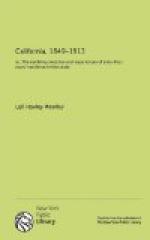Our first campfire at night was on the Little Blue River, a few miles from Independence; it was after dark when we came to a halt, and it was my friend Gross’ turn to cook, while the rest brought him wood and water and made a fire for him by the side of a large stump. I knew he was a fractious man, so I climbed into one of the wagons where I could see how he got along. The first thing that attracted my attention was the coffee pot upside down, next away went the bacon out of the pan into the fire. By this time he was getting warm inside as well as outside, and I could hear some small “cuss words”; next he looked into the Dutch oven, and saw that his dough had turned to charcoal. I got down into the wagon out of sight, and peeked through a crack; he grew furious, danced around the fire, and the air was full of big words. Finally we got a little coffee and some cakes and bacon, then I undertook to do a little sleeping but it was no go. Thus ended my first night on the Plains.
In the morning we started on our journey to travel over a level untimbered, uninhabited country for nearly four hundred miles, without anything of especial interest occurring save cholera, from which there was terrible suffering. We lost about seventy-five of our number before we reached Fort Laramie, seven hundred miles from Missouri.
There was a Dutchman in my mess by the name of Lamalfa, who understood but little of English. We had dubbed him “Macaroni” for having brought a lot of the stuff with him and on our second night out it came his turn to stand guard. He was detailed to the inner guard and instructed as to his duties. On the relief of the outer sentinel and his return to camp, Lamalfa issued the challenge which was to repeat three times “Who comes there?” and in case of no response to fire, and as the outer sentinel came upon him he called out “Who comes there three times” and fired; fortunately he was a poor shot and no harm was done.
It seems that “Macaroni” was not aware of there being an outer guard.
When near Fort Childs, four hundred miles out, all the passengers left the wagons, except the drivers, and walked on in advance, leaving the wagons light (they were canvas covered). There came up one of those terrible hailstorms, common in that country, which pelted the mules with such severity as to cause them to take fright and run away, breaking loose from the wagons which were taken by the storm in another direction, first wheels up, then top, until the latter was all in rags; then they stopped. When we came into camp at night they looked sorry enough and you would have thought they had just come out of a fierce fight.
We pursued our journey along the south bank of the Platte until we reached Fort Laramie, capturing some antelopes and occasionally a buffalo. Up to this time we had had a great deal of sickness in camp. I remember one poor fellow (his name I have forgotten), we called him Chihuahua Bob; he was a jovial, good natured fellow and drove one of the eight-mule baggage wagons. I enquired about him one morning and was told that he had died during the night of cholera, and had been left in his shallow grave.




